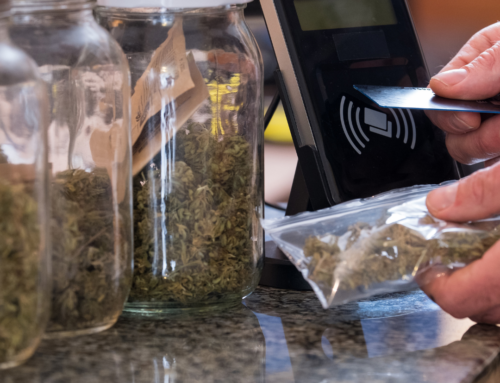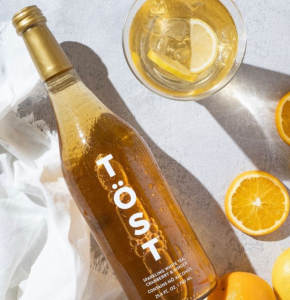
Image courtesy of Tost Beverages
Dry January… (But Not)
If you aren’t doing it yourself, you probably know someone who is participating in Dry January. A month where people commit to put down the booze and give it a break. But this year the New Years tradition has more participation than ever with 1 in 7 Americans committing according to a poll, not surprisingly given the rise in alcohol consumption during 2020:
Alcohol sales in 2020 were up 52%, and a report by JAMA finds Alcohol consumption has increased by 14% compared with a year ago, including 17% for women. The study also showed a 41% increase in heavy drinking for women.
The studies show that women in particular are more vulnerable to over consumption during times of stress. With many quarantined at home with no daily routine and taking care of their families… the bottle sounds like a good idea to ease the mounting tension. This behavior pattern, however, puts into effect an all too easy “solution” which in turn results in physical and mental health consequences.
January began with social media splattered in hashtags #dryjanuary and the largest participant group ever, with a strong resolve to stick it out for the month. But then the attack on the US capitol occurred January 6th, and the movement took a turn. Memes and hashtags on social media emerged cancelling Dry January due to the stressful unfolding of events. It became clear that many participating deemed it necessary to cancel due to added stress. Not only was this shift predominant on Social media, networks such as The New York Times, Washingtonian, and Variety picked up the story of cancelling Dry January:
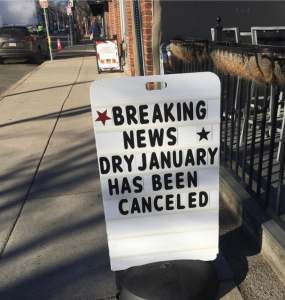
Image Courtesy of @Burton.h.holmes
After five days of lemon detox tea, for example, Emily Titelman, an event producer in Los Angeles, detoured to tequila and orange juice on Wednesday, to ease her nerves after witnessing a mob send elected officials, their staff and media into hiding for their lives. “As someone who is very politically engaged, I felt morally obligated to return to the news. The drink absolutely took the edge off my very real anger.”
-New York Times
As a woman in recovery for alcohol use, of course I am not surprised. A rainy day would have been a great excuse for me to imbibe. What does strike me about this turn of events are how many people (some I know personally) were ready to throw in the towel. A great majority of these participants do not have a substance use disorder, they willingly committed to no alcohol for 31 days. However, a bump in the road came, and alcohol was seen as needed to get through, and deemed necessary.
As I dug a little more this story became increasingly interesting. Apparently Dry January is also big in the UK. They, however, have taken a different angle to get through 31 days alcohol free as reported by MetroUK and Unilad:
Brits are turning to ‘super weed’ from California to help them get through Dry January in lockdown, it has been reported. A drug dealer has claimed he is now selling stronger marijuana from the US for higher prices than usual because he has so many new customers who are replacing alcohol with getting high. He told The Daily Star: ‘I’ve had loads of new buyers who don’t normally smoke weed but need something to replace the hit they get off booze. Forget Dry January, this is high January.’ – Metro UK
The Brit’s (and likely Americans too) were onto something, Dry January is doable…marijuana would just substitute booze. No rules against that. But what does this say about our collective ability to live and deal with the present moment? To not alter our state of mind when things get tough, to sit with ourselves and just be.
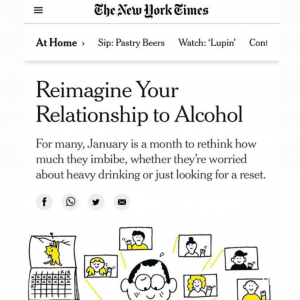
Image Courtesy of New York Times
The spirit of Dry January is intended as a booze free wellness reset to start the New Year. This story was initially going to be about the massive participation this year, but things changed. I noticed how outside events gave people a free pass to drink. How the trends on social media shifted quickly on January 6th and after, to collectively ditch the cause. That marijuana was completely acceptable as long as you could stay “sober” throughout the month.
As a society we have been sold, apparently effectively, that we need alcohol to cope. That life is too tough to handle sober. Forget the devastation this has on those who are prone to substance use disorder, this is a sad and unhealthy reality to acknowledge. So where do we even begin? I suggest, as a start, a re-do Dry February (or any time for that matter). As reported by The New York Times in the article Reimagine Your Relationship to Alcohol, here are steps to help along the way:
1. Get Curious:
Take note of how much you’re drinking, as well as the pros and cons of that consumption. Study your own habits — and be honest about them.
2. Clear out the alcohol
3. But Fill the space with something else:
Identify other activities you love and increase them. Whether it’s exercise or spending time with friends, “we need another outlet to fill the void that alcohol leaves,” Dr. Murphy said.
4. Find Your People:
It helps to connect with others. Free sobriety support communities with virtual meetings include Alcoholics Anonymous, SMART Recovery, SheRecovers, In the Rooms, Eight Step Recovery, Refuge Recovery, Recovery Dharma, LifeRing, and Herren Project, among others
5. Understand What Recovery Means for You
If your month of sobriety was relatively easy to accomplish, then simply consider it a reset. But if you’re having trouble sticking to your plan, you might need more than group meetings.
Sometimes removing something such as alcohol from our lives, even for a month, is an illuminating experience. There are people who, while participating in Dry January (or perhaps Dry February?), will realize that they can not give up alcohol. Alternatively, that they need a substitute such as marijuana to get through. This is a scary but crucial reckoning.
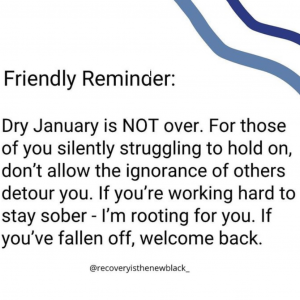
Image courtesy of @Recoveryisthenewblack
I can’t tell you the amount of times I started Dry January, No Booze November, cleanses, even promising my partner I wouldn’t drink with him for 30 days… and I couldn’t do it. Only recovery was my answer for all these false starts.
We at Herren Wellness understand, many of us are in recovery and have been through these painful attempts. Please contact us if you’d like to talk… our approach to recovery focuses on wellness and Dry January or not, we are here for you at any stage in your recovery journey.
About Herren Wellness
When you come here, you are immediately connected with a thriving community of people at all stages of their recovery journey. We introduce healthy habits and routines centered around emotional, physical, and spiritual wellness that provide a solid foundation for rediscovering your interests, experiencing joy in sobriety, and building structure and routine.
We provide several alumni support communities, including a weekly recovery support group, monthly alumni meeting, and online alumni community you can access anytime. Your connection to Herren Wellness doesn’t end when your stay ends; we are there for you throughout your recovery journey.
If you, or a loved one, are looking for help, please call us at (844) 443-7736, email us at info@herrenwellness.com, or fill out a contact form. You are not alone.


